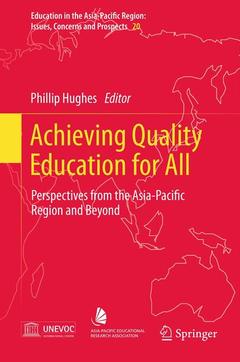Description
Achieving Quality Education for All, 2013
Perspectives from the Asia-Pacific Region and Beyond
Education in the Asia-Pacific Region: Issues, Concerns and Prospects Series, Vol. 20
Coordinator: Hughes Phillip
Language: English
Subjects for Achieving Quality Education for All:
Keywords
Education development; Education for All; Education for Sustainable Development; Education research for sustainable development; Education systems; Effective education; Equitable societies; Equity and education; Functions of education and schooling; Human rights; International Commission on Education; Life-wide learning; Lifelong learning; Lifespan Development; Phillip Hughes; Sustainable development; Teacher-learner partnership; The power of education and schooling; Transformational education; UNESCO
Publication date: 12-2014
244 p. · 15.5x23.5 cm · Paperback
Publication date: 11-2012
244 p. · 15.5x23.5 cm · Paperback
Description
/li>Contents
/li>Comment
/li>
Due to the development of the international Education for All and Education for Sustainable Development movements, for which UNESCO is the lead agency, there has been an increasing emphasis on the power of education and schooling to help build more just and equitable societies. Thus giving everyone the opportunity to develop their talents to the full, regardless of characteristics such as gender, socio-economic status, ethnicity, religious persuasion, or regional location. As enshrined in the United Nations Declaration on Human Rights over five decades ago, everyone has the right to receive a high quality and relevant education. In order to try to achieve this ideal, many countries are substantially re-engineering their education systems with an increasing emphasis on promoting equity and fairness, and on ensuring that everyone has access to a high quality and relevant education. They are also moving away from the traditional outlook of almost exclusively stressing formal education in schools as the most valuable way in which people learn, to accepting that important and valuable learning does not just occur in formal, dedicated education institutions, but also through informal and non-formal means. Thus learning is both lifelong and life-wide. This book brings together the experience and research of 40 recognised and experienced opinion leaders in education around the world. The book investigates the most effective ways of ensuring the UNESCO aim of effective education for all people in the belief that not only should education be a right for all, but also that education and schooling has the potential to transform individual lives and to contribute to the development of more just, humane and equitable societies.
Introduction; Kelli Hughes.- Introduction by the Series Editors; Rupert Maclean.- Foreword: Let a Hundred Flowers Blossom; Phillip Hughes.- SECTION 1: The Public Sector in Education.-1. The Power of Belief; Geoff Masters.- 2. If Wishes Were Horses... ; Denise Bradley.- 3. The Great Australian Divide: Public and Private Schooling; Don Anderson.- 4. What Is a Good School?; Deborah Meier.- 5. Realizing Moral Purpose; Michael Fullan.- 6. ‘Public Education: Its Value is Beyond Price’; Lyndsay Connors.- 7. Basic Schooling for Universal Lifelong Learning: Re-negotiating the Policy Agenda; Malcolm Skilbeck and Helen Connell.- 8. Education - Social Elevator or Holding Area?; Kerry Kennedy.-SECTION 2: Quality in Teaching.- 9. Teaching for Learning, Living and Serving; Carol Nicoll.- 10. How the Call for High Standards of Teaching May Be Hijacked; Brian Caldwell.- 11. A High Quality Education for All; Colin Power.- 12. Quality Education for All; Ian Hill.- 13. Student School Engagement, Self Efficacy and Post-compulsory Retention; Joan Abbott-Chapman.- 14. Did I Experience a Good Education?; Max Walsh.- 15. Supervising or Coaching? Thoughts on Student Teaching; Nancy Faust Sizer.- 16. The Power of Teaching; Susan Pascoe.- 17. Let’s Emphasize Teachers’ Professionalization; Francois Caillods.- 18. The Expectations Have It; Barry McGaw.- SECTION 3: Making Equity Work.- 19. Students with Additional Needs; Geoff Beeson.- 20. Reflections on Education in Remote Indigenous Australia; Michael Jones.- 21. Two Sides of the Coin – Priorities for Good Schools; John Grant.- 22. Getting Accountability Settings Right for Remote Indigenous Australians; Margaret Clark.- 23. Quality and Equity in Education – A Perspective from Mexico; Sylvia Schmelkes.- SECTION 4: Looking More Widely.- 24. Grandparents and Reciprocal Learning for Family Harmony; Robert Strom and Paris Strom.- 25. Flying Upwards and Outwards; Paul Brock.- 26. Four Priorities for Australian Education; Christine Deer.- 27. Rotten at the Core – Paideia Politicised; Patrick Daunt.- 28. Let’s Turn Around and Face the Future; Joanna Le Metais and Don Jordan.- 29. Providing a Balanced Schooling in a Networked World; Mal Lee.- 30. Educating Everybody – Properly!; Don Aitkin.- 31. Three Priorities for a Great Education; Neil Dempster.- SECTION 5: Concluding Comments.- 32. A Humanistic Education; Alexandra Draxler .- 33. Democracy and Pedagogy Count; John Fien.- 34. Literacy Ain’t Everything; Edna Tait.- 35. A World Class Education for Mauritius in the 21st Century; Raj Bhowon.- 36. Values: The Core of Successful School Leadership; Philip Hallinger and Allan Walker.- 37. Education for Some or Education for All?; Rupert Maclean.- Index.
Offers suggestions at international level on funding school systems, organizing schools and developing effective teachers
Covers research from ten very different countries, thus providing wide variety and means of comparison
Recognises the approaches which demonstrate that Education for All is now achievable




